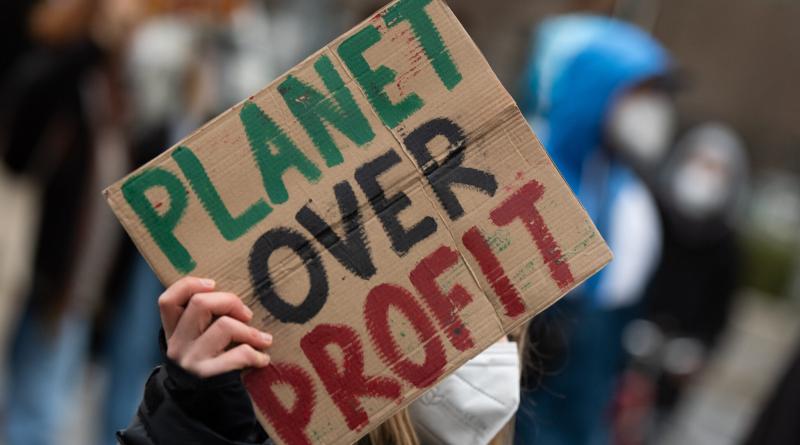Corporate Interests ‘Watered Down’ the Latest IPCC Climate Report, Investigations Find

References to fossil fuels and meat consumption were removed from the report summary, while language bolstering controversial carbon removal technologies were added.
Fierce negotiations between countries working to protect their financial and political interests ultimately “watered down” a landmark climate report released last week by the United Nations’ Intergovernmental Panel on Climate Change, according to a series of recent reports and investigations.
The findings highlight what activists have long warned is hampering meaningful global action to curb rising temperatures—namely, that vested interests are preventing nations from cooperating when it comes to how, exactly, they plan to reduce their emissions and fund efforts to adapt.
The IPCC’s 6th Assessment Report, which was released on March 20, synthesizes years of peer-reviewed research on the causes and consequences of the climate crisis and is arguably the final update by the international body of climate experts before it becomes impossible to prevent the world from warming more than 1.5 degrees Celsius above pre-industrial levels. Once that threshold is crossed, scientists say, entire ecosystems could collapse and millions of lives would likely be lost to intensifying heat waves, storms and famines by the end of the century.
But while scientists broadly agreed over their portion of the synthesis report, which consisted of boiling down seven years of complex scientific findings into 85 pages, a far more volatile negotiation process was happening behind closed doors over the shorter summary of the report intended for policymakers. The approval process for that report summary, which took place earlier this month in Switzerland, requires unanimous buy-in from delegates of all 195 nations involved, making it a particularly fraught and arduous undertaking.
During those talks, several nations lobbied to water down or remove references to the environmental costs of burning fossil fuels and consuming meat, as well as add language that bolsters support for controversial technologies that capture carbon dioxide from smokestacks or remove it from the air, according to a series of news reports published late last week. In many cases, the reports said, delegates from fossil fuel and meat producing countries successfully made changes to the policymaker summary that directly contradict scientific evidence.
“Governments come to the IPCC approval session with legitimate concerns—but also with vested interests,” Lili Fuhr, deputy director of climate and energy at the Center for International Environmental Law, one of the nonprofits allowed to observe the confidential negotiations, told Heatmap News. “That is especially true for countries that have state-owned fossil fuel companies and representatives of those companies in their delegations to international climate meetings.”
Saudi Arabia, China and India, for example, made repeated attempts to water down references to fossil fuels as the main cause of global warming, according to the nonprofit Earth Negotiations Bulletin, which was the only media allowed to observe the talks. That report also revealed efforts by several oil and gas-producing nations to include language in the final text that cast a better light on carbon capture and removal technologies. Environmentalists have long argued that those technologies are difficult to scale and pull resources away from more proven climate solutions, like renewable energy.
In some spots, straightforward language regarding the benefits of renewable energy was replaced with far more confusing technical lingo, Axios reporters Ben Geman and Andrew Freedman noted in their quick analysis of the Earth Negotiations Bulletin account. “A sentence saying that ‘electricity from photovoltaics and wind is now cheaper than energy from fossil fuels in many regions’ became: ‘maintaining emission-intensive systems may, in some regions and sectors, be more expensive than transitioning to low emission systems,’ after strong objections by Saudi Arabia,” the reporters wrote.
Michael Thomas, who writes the climate newsletter Distilled, looked at the changes made between a copy of the IPCC report summary that was leaked by scientists in 2021 and the final version published last week. He found that delegates from Brazil and Argentina had successfully removed any mention of the negative impacts of meat on the environment, as well as recommendations that people in wealthy countries reduce their meat consumption and shift their diets to include more plant-based foods.
For example, a sentence that said “plant-based diets can reduce (greenhouse gas) emissions by up to 50% compared to the average emission intensive Western diet” was included in the leaked report but not in the final report, Thomas wrote.
Ajit Niranjan, who wrote the Heatmap News story, confirmed many of those same findings with four sources who attended the negotiations but spoke on the condition of remaining anonymous. That report also found that the United States tried to cut references to international finance gaps to pay for climate adaptation and mitigation efforts, and China tried to cut a sentence that noted the world has 12 years to cut carbon pollution by two-thirds—eventually settling on including the information in a table instead.
The findings appear to support past warnings from some of the most prominent climate activists and scientists, who say the undue influence of money on national and global politics has made addressing climate change nearly impossible. Last year, James Hansen, the prominent climate scientist who elevated the issue of global warming when he famously testified in front of Congress in 1988, warned young people “that they cannot solve the energy and climate problem without addressing the special interest problem.”
Several prominent climate activists, including Greta Thunberg, reiterated that same warning earlier this year after it was announced that the top fossil fuel executive in one of the world’s leading oil producing countries, the United Arab Emirates, would host the U.N.’s flagship climate summit this year.
In fact, corporate influence over global climate efforts is so well documented at this point that the IPCC authors wanted to include references to it in the final report summary released last week, Thomas wrote in his report for Distilled. “In a leaked draft, scientists cited studies showing the impact of lobbying. They included ‘vested interests’ as one of the ‘factors limiting ambitious transformation,’” he said. “But it appears that those very vested interests deleted this text too. The final report makes no mention of the role that lobbying plays in preventing climate action.”
Kristoffer Tigue
Reporter, New York City
Kristoffer Tigue is a New York City-based reporter for Inside Climate News, where he covers environmental justice issues, writes the Today’s Climate newsletter and manages ICN’s social media. His work has been published in Reuters, Scientific American, Public Radio International and CNBC. Tigue holds a Master’s degree in journalism from the Missouri School of Journalism, where his feature writing won several Missouri Press Association awards.
cover photo: At a demonstration of the climate activists Fridays For Future, a participant carries a placard with the inscription "Planet over Profit." Credit: Christophe Gateau/picture alliance via Getty Images





